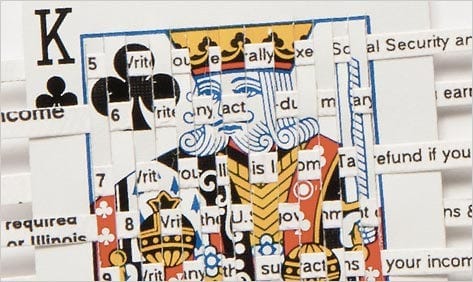Unfinished enlightenment

In this, Wallace’s so-called unfinished novel, that is actually at times part memoir and part journalistic feat compiled by his friend and editor posthumously (for Wallace) about his 13 months working for ‘the Service’ at Lake James Illinois’s IRS Post 047 while serving suspension from university (all explained in the book’s Foreword, beginning on page 66 of the first edition hardcover from Little, Brown), there is not only an inside look at the ‘Initiative’, which changed the IRS (forever) in the 80s from a moral entity into a profit-motivated bureaucracy with the assistance of advancing computer technology (see ANADA), but also a sensitive, serious, yet hardly cynical lens—actually multiple lenses, since Wallace attracts the detailed collaboration of then coworkers like ‘Irrelevant’ Chris Fogle [whose 100-page chapter is only irrelevant when he focuses on himself, on his transformation from a nihilistic teen into a committed examiner who was called to account] to supplement Wallace’s expertly taken notebook transcripts—into the setting of IRS Post 047 off Self Storage Highway, the lives of the workers within its walls, and in a way that Wallace so often provides, a lens into not only the reader’s personal relationship with government and questions about civic responsibility, but also, inevitably, primes deeper observations about ennui, malaise, loneliness, boredom, and possibly heroism.
My favorite section—apart from the 15-page car-ride stuck in bureaucratically induced traffic on Self Storage Highway on Wallace’s first day at Post 047 (where we learn he is mistaken for a transfer, arriving the following day, David Francis Wallace, who is several paygrades above him)—was a 60-page Happy Hour conversation between the sexy yet assumed crazy Rand and the levitating-when-he-focuses Drinion (once seen levitating upside down while examining a return) wherein the detail of their mannerisms, the pacing of Rand’s narrative, and subtle blooming characterizations amplify each phrase of arguably tedious dialogue across multiple layers not only for these two characters, but also amplify previously cast scenes (at this late stage in the book), helping to build the case for a potential path to enlightenment but also a showcase of those unstoppable individuals (like Drinion) who have become so because they can, and have, immersed themselves in boredom.
Even with Michael Pietsch’s admirable work to bring us The Pale King, I and many others can dream of what might have been if DFW stayed with us long enough to finish this particular job. Pietsch’s selection of notes which accompanied the manuscript sections left behind do provide clues to Wallace’s intended direction—however there was no outline apart from the embryonic “1) Paying attention, boredom, ADD, Machines vs. people at performing mindless jobs; 2) Being individual vs. being part of larger things—paying taxes, being “lone gun” in IRS vs. team player”—and though, if anything, it feels as though Wallace was just getting started.
This said, I was moved to not only open this book—a pleasant surprise while walking the shelves of the nearby Pierre Bottineau Library, part of the Hennepin County system, this past Tuesday March 2, 2020—but follow through to the unfinished end of what is nourishingly well balanced, evenly paced, and artful take on sadness and boredom.
I wish I’d found this sooner.
A-
PS After writing the above I found Jon Baskin’s book, Ordinary Unhappiness: The Therapeutic Fiction of David Foster Wallace, which includes a section on The Pale King, where the intrigued reader will undoubtedly find insights he hadn’t himself noticed—such as that Wallace with The Pale King is suggesting “that a whole culture can persist in a state of immaturity and blindness to itself” (131)—which inspires me to reach for an even closer reading in my upcoming efforts.